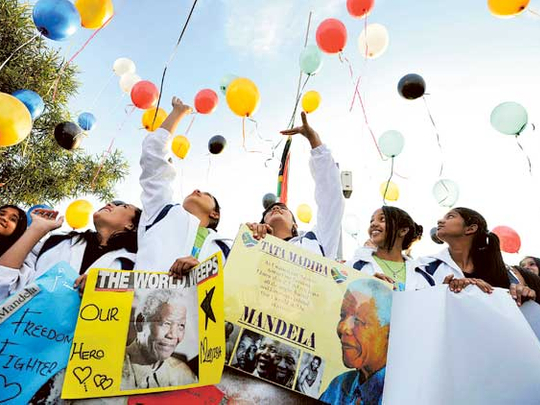
Johannesburg is in many ways the heart of South Africa. A sprawling metropolis, it cannot help but pulse with life, and its residents are considered among the most hard-nosed, street-smart in the country.
On Fridays, the beat of the city becomes particularly frenetic, as the working week draws to a close and its people gear up for the weekend. Not so this Friday, the day after the announcement of the death of Nelson Mandela.
In many ways, the city and its people got on with business as usual — his death had long been expected. But the morning traffic seemed subdued, even around the highways that led to Houghton, the suburb where Mandela lived and where cars were pulled on the side of the road as people walked to his house, flowers in hand, to pay their last respects.
And it was not that the radio stations, that accompany most journeys, were playing particularly sombre music. South Africans do not so much mourn their leaders, as celebrate their lives. While stations were often playing a different tune in tribute to Mandela, the songs were not particularly down beat. Later in the day, as more people had a chance to gather, at official places of tribute or informally, freedom songs became louder and the dancing picked-up pace.
While there is a palpable feeling of loss in the country, there is a sense that his time had come — in part a result of earlier scares of his passing, but more a recognition of a long life well lived and a peace well deserved.
But even as many determinedly went about their daily business, their thoughts would unconsciously escape from their lips — “Eish, Madiba”.
“Eish” is a South African expression that has many different meanings, but very often it is used simply to express what is in the heart, especially when other words do not seem adequate. Madiba is Mandela’s family name that has become a national term of endearment.
In the shops, when an eye caught one of the many documentaries about his life playing on television, there would be an: “Eish, Madiba”.
On the streets, when somebody walked past a flag at half-mast, there would be an: “Eish, Madiba.”
As people read tributes and comments on their social networks or spoke in small or large gatherings, there would be an: “Eish, Madiba”.
On this Friday, “Eish, Madiba” could perhaps best be translated as: “Tata (father), you will be missed”. For while the world may be mourning an icon and Africa a principled leader, South Africans have lost a father figure.
This is perhaps best shown in many of the tributes paid by those who knew him or whose lives he touched. Many South Africans chose not speak about Mandela’s political achievements, but rather of being warmly welcomed into his presence, of his love for ordinary people and his taking the time to recognise and speak to them, often between seemingly pressing engagements.
As usual, Archbishop Desmond Tutu, perhaps expressed it best. “For the past 24 years, Madiba taught us how to come together and believe in ourselves and each other. He taught us extraordinary practical lessons about forgiveness, compassion and reconciliation. God is asking us South Africans: please become what you are. Show the world that we are members of one family, not as a figure of speech but it is for real.”
And, despite some fears to the contrary, Mandela’s death has triggered a popular recommitment to his vision for South Africa. Ahead of an election next year — likely to be the toughest yet faced by the ruling African National Congress (ANC), the liberation movement to which Mandela gave his life — the country has witnessed an ugly, knockdown, political battle amongst its leaders that has soured faith in the country. There is a deep-seated fear that South Africa is losing its battles against divisions, cronyism and corruption.
But, an online newspaper post echoed a popular sentiment expressed wherever people have paid tribute to Mandela. “South Africans owe it to Madiba to be the custodians of his beliefs and pass on his values to the next generations, so those that did not have the honour to live throughout his life time can experience his legacy. This can only happen if his values are lived by and not just spoken about,” it said.
Even now, Mandela is still bringing South Africans together.
— Paul Stober is a former Deputy Managing Editor: Business at Gulf News.












